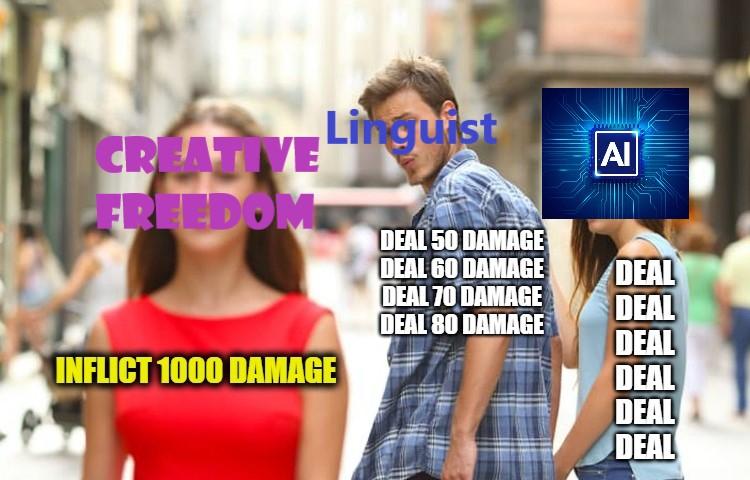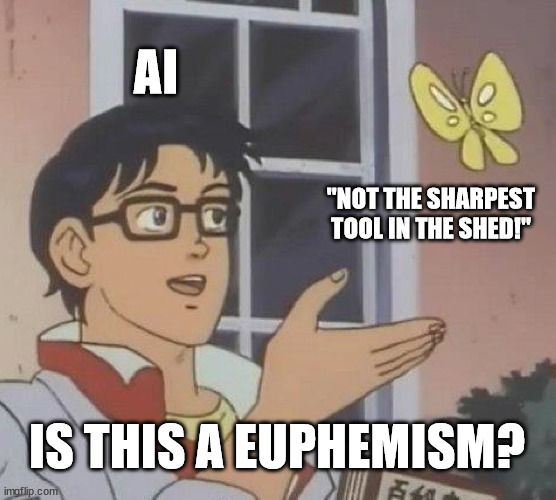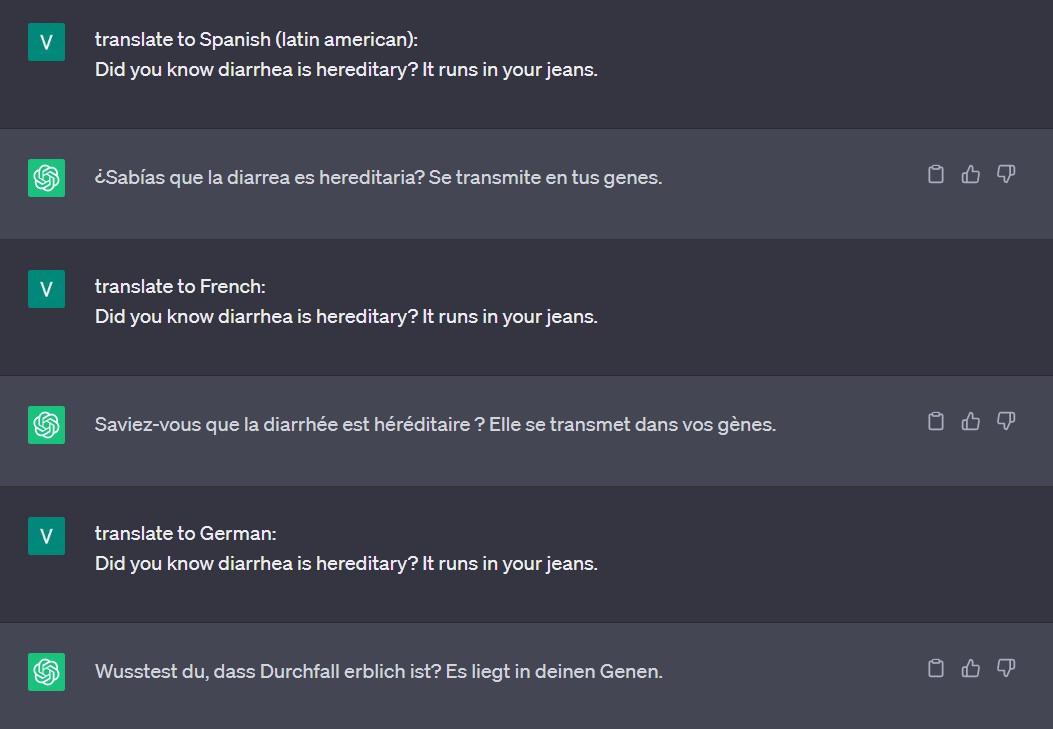Let’s consider the implications of new technologies—AI. Our project manager Valeriy Timchenko is going to go over the things the machine can and cannot do.
ChatGPT is a heated topic at the moment, particularly with thoughts on how it can affect the localization industry:
It will revolutionize our approach to handling texts!
It will make localization cheaper!
It will make the interpreter’s job obsolete!
For the sake of completeness, let’s substitute “ChatGPT” with “AI” or “Machine” and consider the implications of these new technologies. I’m going to go over the things the machine can and cannot do. The list of reasonable “cans” is quite short, so we’ll begin with those.
Consistency
There is one thing that just can’t be taken from AI—it can preserve the consistency of the texts, though sometimes in a somewhat overzealous manner.

Now onto the “cannots.”
Style
“Style expectations” is a term invented to create an illusion of standards. With localization, each linguist’s style is unique and can’t be replicated accurately and consistently (not yet, ChatGPT, don’t give me that look). Of course, there is an argument to be made that if a standard is ephemeral, then a machine could just as well create its own norm and stick to it. Sounds about right? Well, not quite.
You can prompt AI to include informal words, local idioms, words starting with the same letter, and so on. You can even make a glossary of terms that must be used in every sentence. But how would you prompt it to be annoying? That’s a thing humans excel at, so it makes sense they (I mean, WE) would be able to reflect that effectively in a translation.
Let’s imagine a game where all your actions are accompanied by the comments of a pestering companion that you just can’t get rid of:
EN: Experience gained: {0}. Got smarter, did ya?
SPA (LatAm): Experiencia obtenida: {0}. ¿Ya te sientes superior?
FR: Expérience acquise : {0}. Vous vous coucherez moins bête ce soir!
DE: Erfahrung erhalten: {0}. Hältst dich wohl für ganz schlau, was?
EN: Quest completed! Satisfied?
SPA (LatAm): ¡Misión cumplida! ¿Ya estás feliz?
FR: Quête terminée ! Tu es content de toi ?
DE: Quest abgeschlossen! Hast du ganz doll gemacht!

Euphemisms
It takes a lot of time and skill to find an obscure yet clear word to effectively convey an intended meaning.
Mr. Sanderson, allow me to use an example from your brilliant Stormlight Archive.
Imagine a world where obscenities took a form that is different from ours. Common swear words are not being used, instead they are substituted with “storm” and its derivatives. Or, should the speaker be a child, the verb “starve” would make for a milder replacement.
Want to have a guess at what is encrypted in this seemingly innocuous phrase?
EN: Storming fool!
SPA (LatAm): ¡Necio de las tormentas!
FR: Crétin des foudres!
DE: Sturmverdammter Narr!
As much as I trust AI to handle a passable, straightforward translation, having this localized as “a raging knucklehead” would certainly NOT raise the book’s appeal. This part of the text should be handled by a person in 100% cases.


Puns
Translating texts is good, localizing is better. And a clever pun squeezed in a wall of text never fails to spike a reader’s interest.
EN: Did you know diarrhea is hereditary? It runs in your jeans.
SPA (LatAm): ¿Sabías que hallaron el gen de la timidez? Sí, estaba escondido.
FR: La diarrhée atteint plus de gens qu’on le croit. C’est une maladie courante.
DE: Was steht auf dem Grabstein eines Mathematikers? Tja, damit hat er nicht gerechnet.
A machine wouldn’t blink an eye (or is that screen?) and would translate this to the letter. Don’t just take my word for it, here is a screenshot from ChatGPT.

This couldn’t have been any further from the original meaning. We can’t blame AI though—this play on words can be a tough nut to crack even for an experienced linguist. And this is exactly where human ingenuity shows its strength—an untranslatable joke can be substituted with a similar one without losing the intent of the original. Flexibility is the key!
Context
No, this won’t be about lack of context in one-word lines. Try getting the correct meaning of “Order” on a first attempt. Unless the client provides an explanation, a linguist is as likely to be wrong as a machine.

What I’m referring to here is the transparent context. For a human, of course. Take a look at this sentence.
EN: Do you know that humans eat more bananas than monkeys? Bananas are just tastier.
Sure, a really smart AI would’ve already learned this joke by heart (core?), considering the joke’s age, but let’s pretend it’s a brand-new joke. I’ve seen people getting confused at this even after a hint. For AI to nail this translation, it would have to get a manual cue. By who? That’s right, by a human.
Of course, some of these points are exaggerated for fun’s sake. We’re not trying to talk anyone out of using machine translation in its entirety. It’s quick, it’s cheap, it gets the job done. But it’s flawed in its current state, and using it blindly will inevitably lead to negative feedback from the players, which is exactly the thing all developers and, by extension, Language Service Providers are trying to avoid. The point of this article is to illustrate the hilarious outcomes AI can deliver if used as a blunt tool without supervision of an experienced linguist. In the end, the choice around AI’s use is totally up to you. After all, what good is having a tool that collects dust on a shelf without even attempting to use it?




